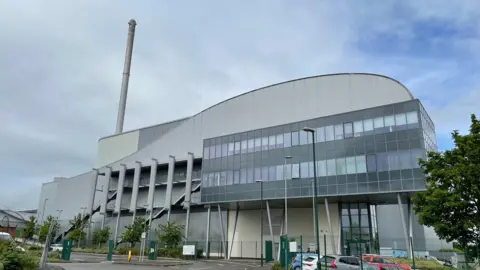Council warns of new waste tax it 'cannot afford'
 BBC
BBCA council has warned that a new carbon tax on incinerated waste would be "an additional financial burden" that it "cannot afford".
All of Shropshire Council's non-recyclable waste is burned at the Battlefield Energy Recovery Facility (ERF) in Shrewsbury, which generates electricity in the process.
The government has said expanding the UK Emissions Trading Scheme (ETS) to include incinerators from 2028 will cut emissions and improve recycling.
Yet nine-in-ten local authorities have said they will not be able to meet these additional costs within their existing waste and recycling budgets.
Last year, BBC research found that burning household rubbish to make electricity was now the dirtiest way the UK generates power.

The Local Government Association (LGA), which represents councils in England and Wales, predicts that the ETS could collectively cost councils up to £747m in 2028, rising to £1.1bn in 2036.
Shropshire Council owns the Battlefield ERF but it is operated by waste management firm Violia.
The site generates enough electricity to power 10,000 homes.
Exactly how much cost will be passed on to the council is unclear. But it is likely to be millions of pounds - money the council would struggle to find.
The LGA has argued that councils are not commercial operators and cannot refuse waste collections.
'Additional financial burden'
Shropshire Council said the authority was assessing the cost of the proposed tax and would work with Violia to develop a strategy to reduce the impact on taxpayers.
"This is clearly an additional financial burden that Shropshire Council cannot afford," the authority said.
"The most sensible option would be to compensate councils as part of the finance settlement, though a more cost-effective option would be to not pass the costs on to local government in the first place."
The expansion of the carbon tax, which currently applies to aviation and energy intensive industries, has been criticised by the County Councils Network.
The organisation is calling on the government to focus instead on the industries creating fossil-based materials, such as plastic packaging, textiles, electrical items and furniture.
"Passing the cost on to councils when we're not in a position to control waste disposal to avoid incineration, or we're locked into extremely long contacts, is crazy behaviour by government," said Richard Clewer, a spokesperson for the County Councils Network and former Conservative leader of Wiltshire Council.
"The cost will literally push councils over the edge to bankruptcy.
"Almost all top-tier councils dealing with social care are facing very significant cost pressures . . . the government has got to be more thoughtful and joined up than this."
The Battlefield ERF, which has been operational since 2015, burns about 100,000 tonnes of waste a year, including all of Shropshire Council's non-recyclables, plus waste from other areas, including Telford and Wrekin.
Food waste has increased the tonnage of residual waste being burned at the Battlefield incinerator after a ban on scraps being put in green bins, rolled out from November when the £56 garden waste charge was introduced.
However, all councils must provide a free weekly food waste collection by April next year. The leftover food will end up being turned into biogas rather than being incinerated.
The government says it wants to manage waste in a way that works for communities and is fit for the future.
The Department for Energy Security and Net Zero said "expanding the UK Emissions Trading Scheme to include energy from waste facilities will cut emissions and drive investment in cleaner supply chains.
"We continue to engage with industry and local authorities on the detail of this scheme, including how costs will be managed to reflect emissions reductions and recycling efforts, and will provide further updates in due course."
Follow BBC Shropshire on BBC Sounds, Facebook, X and Instagram.
